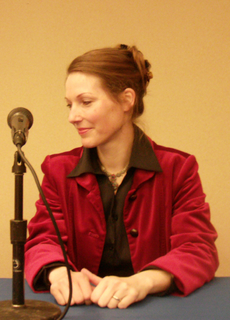A Quote by June Brown
I felt an intense loneliness after my sister died. I was seven at the time, she was eight, and I realised after her death that she accepted me for who I was.
Related Quotes
...she could express her soul with that voice, whenver I listened to her I felt my life meant more than mere biology...she could really hear, she understood structure and she could analyze exactly what it was about a piece of music that had to be rendered just so...she was a very emotional person, Annette. She brought that out in other people. After she died I don't think I ever really felt anything again.
After my mother died, I learned that she'd had a scholarship to the University of Nebraska, but - in kind of a tradition that females don't do things like that - her father prevented her from going. She always said that she wasn't allowed to go to college, but until she died, I never knew that she'd had this scholarship.
She felt a stealing sense of fatigue as she walked; the sparkle had died out of her, and the taste of life was stale on her lips. She hardly knew what she had been seeking, or why the failure to find it had so blotted the light from her sky: she was only aware of a vague sense of failure, of an inner isolation deeper than the loneliness about her.
She had died peacefully, in her sleep, after an evening of listening to all of her favorite Fred Astaire songs, one crackling record after another. Once the last chord of the last piece had died out, she had stood up and opened the French doors to the garden outside, perhaps waiting to breathe in the honeysuckle one more time.
I was beating Amanda Lim to death with the tire iron, I accidently hit her in the finger. It was a fake tire iron, but it was run through with metal in the middle and when she looked up after the take, she was crying and it really hurt her and so I felt pretty terrible about that, but they got back at me when I had my big fight with Casey at the end and she just beat the bejesus out of me, being the amazing stuntwoman that she is.
She, uh, came out of the closet recently, my niece. Um... She announced to the family that she's a lesbian and... She's seven, did I mention that? And, uh, I don't even know if she knows what a lesbian is, but I support her completely. And, uh... I'll tell you what's heartbreaking. My sister punished her for it. Can you believe that? No pussy for a week. Which to us may not sound like... But when you're seven, you know, a week is a long time.
Ruth hadn't talked to my sister since before my death, and then it was only to excuse herself in the hallway at school. But she'd seen Lindsey walking home with Samuel and seen her smile with him. She watched as my sister said yes to pancakes and no to everything else. She had tried to imagine herself being my sister as she had spent time imagining being me.
Margaret had always dreaded lest her courage should fail her in any emergency, and she should be proved to be, what she dreaded lest she was--a coward. But now, in this real great time of reasonable fear and nearness of terror, she forgot herself, and felt only an intense sympathy--intense to painfulness--in the interests of the moment.
"She (Minnie Ruth Solomon) was unusual because even though I knew her family was as poor as ours, nothing she said or did seemed touched by that. Or by prejudice. Or by anything the world said or did. It was as if she had something inside her that somehow made all that not count. I fell in love with her some the first time we ever talked, and a little bit more every time after that until I thought I couldn't love her more than I did. And when I felt that way, I asked her to marry me . . . and she said she would."




































